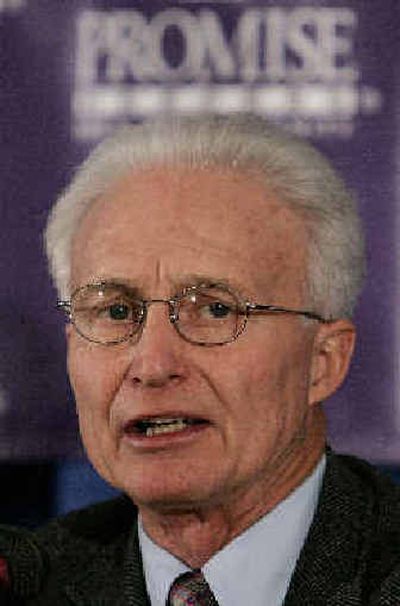Crossroads

A small sign in the Promise Keepers headquarters in Denver reads “70,000” – the number of people the Christian men’s organization needs to fill Razorback Stadium in Arkansas for one of its revivals this summer after years of dwindling attendance.
Back in the 1990s, tens of thousands of men crowded football stadiums across the United States to listen to the Promise Keepers’ message, hoping to become better husbands, fathers and Christians.
Yet by the end of the decade, the evangelical group had only a fraction of the following it once did.
Now, after several years of change, Promise Keepers has scheduled 20 events this year around the country (including Oct. 28-29 at the Tacoma Dome), believing its message is just as relevant now as it was 15 years ago.
Nearly 9,000 men attended the first of those events last weekend in Fort Wayne, Ind.
“We’re at a crossroads,” said Dave Wardell, who co-founded the organization in 1990 with former University of Colorado football coach Bill McCartney. “I think we can see a resurgence again, because it’s still the age-old problem of men. Plus we have new generations coming in.”
At its peak in 1996, the organization drew about 1.1 million men to 22 stadium conferences nationwide. Its rally the following year in Washington drew hundreds of thousands of men for speeches, stadium-style “waves” and thundering chants of, “Dear God, I am a sinner. … Please forgive me and change me.”
Men cheered, sang and even bounced beach balls through the crowd as they listened to speakers urging them to accept Jesus Christ in their lives. Star athletes, Christian rockers and comedians asked the men to better serve their families and communities using the Bible as their guide.
Relationships with women was a common theme, though women typically weren’t seen.
“We could fill a stadium before we could get the brochures out,” said Tom Fortson, the organization’s president and chief executive officer. However, he added, “we did not have the organization or ability to sustain the growth.”
Promise Keepers began to have financial problems when it decided to stop charging admission fees for its conventions, believing they were a deterrent. But voluntary contributions never covered the loss, and the group was forced to lay off hundreds of employees in 1998.
The group also was forced to cut its volunteer program, in which men worked with local churches to recruit for Promise Keepers events and kept the national organization informed on what men wanted. By last year, just 179,000 men attended 18 conferences.
Rick Kingham, senior pastor of Overlake Christian Church in Redmond, Wash., said dropping attendance wasn’t the Promise Keepers’ problem alone.
“It’s probably more of an indictment against our society, because men really are asleep, more now than I’ve every seen before,” Kingham said, noting Promise Keepers’ 2005 theme is “The Awakening – An Unpredictable Adventure.”
“Promise Keepers wants to waken men so that they can really see the purpose of God in their life and fulfill it with all their passion and all of their heart,” Kingham said.
Fortson said Promise Keepers has begun to work better as an organization. It has reinstated convention fees, reduced costs and outsourced some jobs to improve financially.
The group also has created seven ministry initiatives to achieve its long-standing vision, “Men Transformed Worldwide.” It is trying to create partnerships with local Christian men’s groups – think Bible study groups or church breakfast clubs – and expand its international reach through overseas Christian groups. Fortson recently traveled to Sri Lanka and is working with a group in India to raise money for fishermen affected by the tsunami.
Promise Keepers also has restarted its national volunteer program, with about 1,000 men.
Fortson said he hopes to engage men by discussing issues including abortion – which Promise Keepers insists is a men’s issue in the greater right-to-life debate – and racism.
“By talking about these issues, men can develop a vital relationship with other men” and become more capable of discussing spirituality and their relationship with Christ,” Fortson said.
“Men are spiritually searching now. I think that has intensified,” he said. “We’re not raising the questions. The questions are already out there.”
Fortson said he wants the new conferences to be deeper and franker than previous years, when men usually would leave feeling energized and good about themselves.
“It doesn’t mean that we’re not going to support you, but you may not feel good from what you’ve heard,” he said. “I think what we’re doing now is drilling deeper with men and calling them out, and some guys don’t want to go there.”
John Bartkowski, a professor of sociology at Mississippi State University, said he doubted Promise Keepers would ever be able to re-create its heyday of the 1990s, partly because the public may have grown tired of its message and brand of spirituality.
But he added, “From a social movement perspective, it’s still pretty respectable, I’d have to say.”
McCartney, who resigned as president of Promise Keepers in 2003, says its true success or failure has little to do with attendance rates.
“The bottom line is if God shows up,” he said. “In my estimation, God’s never stopped coming.”